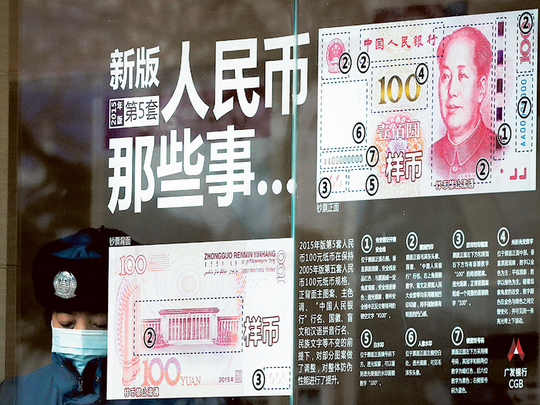
BEIJING: China’s new rules on overseas currency transfers are not capital controls, the official Xinhua News Agency reported, even as some banks told customers that purchases of foreign currency for property, securities and life insurance were not allowed.
Capital outflows have been a growing concern for the government in the past year as it attempted to put the economy back on track and keep the currency stable without exhausting its foreign exchange reserves, which tumbled to $3.052 trillion in November, the lowest in almost six years.
Starting in July 2017, banks and other financial institutions in China will have to report all domestic and overseas cash transactions of more than 50,000 yuan ($7,201; Dh26,450), compared with 200,000 yuan previously, the central bank said on Friday.
Banks will also need to report any overseas transfers by individuals of $10,000 or more.
The responsibility of reporting such transactions will be assumed by financial institutions, and there will also be no extra documentation or official approval procedures required for companies or individuals, Xinhua reported late on Sunday, citing Ma Jun, chief economist of the People’s Bank of China (PBOC).
The government has said its checks on transactions are meant to target money laundering, terrorism financing and fake outbound investment transactions, and not normal, legitimate business activities.
China’s foreign exchange regulator said late on Saturday that from January 1 it would step up scrutiny on individual foreign currency purchases and strengthen punishment for illegal money outflows, although the $50,000 annual individual quota will remain unchanged.
Regulations allow Chinese nationals a foreign exchange quota of $50,000 a year.
Since Sunday, Bank of Shanghai and China Merchants Bank customers have been required to fill out a new online form when applying to purchase foreign exchange through their respective mobile banking apps.
The form restricted foreign exchange from being used to buy overseas property, securities, life insurance or other investment-style insurance products.
Approved uses of funds were restricted to non-investment uses including tourism, schooling, business travel, and medical care.
Customers must also indicate how they plan to use the foreign currency and when they plan to spend it.
Reuters was not able to reach Bank of Shanghai and China Merchants Bank for comment due to a public holiday on Monday.
Reuters was also unable to immediately confirm if all banks in China were using the new application form.
— Reuters
BOX — China central bank adviser calls for 6%-7% growth target range
BEIJING: China should set a more flexible 2017 economic growth target to give policymakers more room to enact reform, according to Huang Yiping, an adviser to the People’s Bank of China.
He proposed a range of 6 per cent to 7 per cent for this year, compared with the 6.5 per cent to 7 per cent objective in 2016, the official Xinhua News Agency reported. Last year’s target, the first range in two decades, was down from 7 per cent for 2015.
The country’s leaders also have a longer-term objective. President Xi Jinping has said he wants expansion to average at least 6.5 per cent in the five years through 2020 to achieve the Communist Party promise of building a “moderately prosperous society” by that year with gross domestic product and income levels double those of 2010.
“The 6.5 per cent target is just an average rate,” Huang, an economics professor at Peking University, told Xinhua in an interview published late Sunday. “As long as employment is stable, a slightly wider growth target range in the short term will reduce the need for pro-growth efforts and give policymakers more room to focus on reforms.”
-Bloomberg












